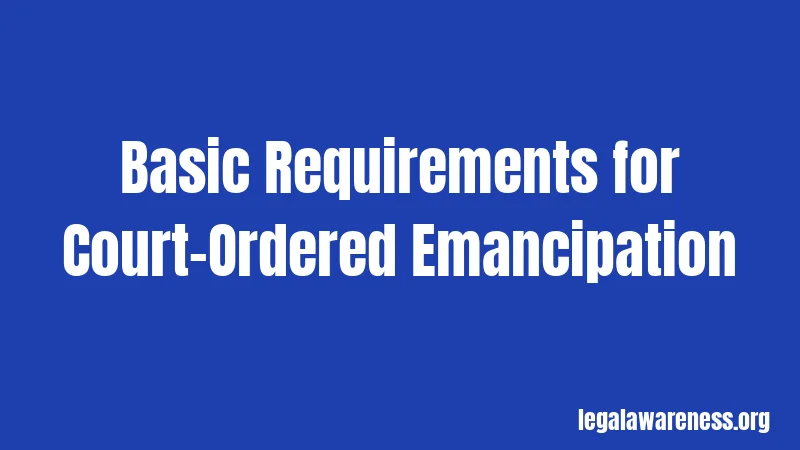Emancipation Laws in Michigan (2026): Your Independence Guide
Most teens don’t realize how complex getting emancipated really is. It’s not just about moving out and calling yourself an adult. In Michigan, emancipation laws are specific, the process is formal, and the requirements are strict. Let’s break down exactly what you need to know.
Here’s the deal. If you’re thinking about emancipation in Michigan, you need to understand both the legal process and what comes after. This isn’t a decision to take lightly.
What Is Emancipation?

Emancipation means legally freeing a minor from their parents’ control. Think of it as becoming an adult before you turn 18.
Parents normally have the right to make decisions for their kids. They control where you live. They manage your money. They decide about school and medical care.
Emancipation changes all that. You get adult rights. But you also get adult responsibilities.
Sound complicated? It’s actually pretty straightforward once you understand the rules.
Two Ways to Get Emancipated in Michigan
Michigan law recognizes two types of emancipation. They’re totally different processes.
Emancipation by Operation of Law
This happens automatically in certain situations. No court needed.
You’re automatically emancipated when you’re already emancipated under another state’s laws. Pretty simple.
There are also temporary emancipations for medical care. If you’re in police custody and your parents can’t be found, you can consent to emergency medical treatment. If you’re incarcerated in a youth facility and your parents can’t be located, you can consent to preventive health care.
These temporary emancipations end when the medical care ends or you’re released from custody.
Court-Ordered Emancipation
This is the main process most people think about. It requires filing a petition with the court.
You need to convince a judge that emancipation is in your best interest. More on that in a minute.
Basic Requirements for Court-Ordered Emancipation

Wondering if you qualify? Here’s what Michigan law requires.
You must be at least 16 years old. No exceptions. If you’re 15 or younger, the court can’t emancipate you through this process.
You must be a Michigan resident. Some courts want you to live in the county for a year before filing. Others don’t. Call your local court to check.
The filing fee is $175. That’s what it costs in most Michigan counties. A few counties charge slightly different amounts.
You’ll need a certified copy of your birth certificate. This usually costs between $10 and $50, depending on your county.
Honestly, the money part trips up a lot of people. You need $175 just to file, plus birth certificate costs, plus you need to prove you can support yourself financially.
Proving You Can Manage Your Affairs
Here’s where it gets serious. The judge needs to see you can handle adult life.
Financial Management
You must prove you can manage money. That means showing proof of employment or other support.
Cash assistance and food stamps don’t count. The law specifically says government benefits aren’t enough. You need actual income from a job or other legitimate source.
The judge wants to see you understand budgeting. Do you know how to pay rent? Can you handle utilities? Do you understand how to manage bills?
Personal and Social Affairs
You need to show you can make mature decisions. This includes having stable housing arranged.
The judge looks at your education situation. Are you in school? Do you have good attendance? Are you planning to continue your education?
You need to demonstrate community support. Who can you turn to for help? Do you have a support network?
Wait, it gets better. You also need to prove you understand what emancipation actually means legally.
The Required Affidavit
An affidavit from an adult who personally knows you and believes emancipation is in your best interest is required.
This person must fall into specific categories. They can be a physician, nurse, pastor, priest, psychologist, family therapist, social worker, school administrator, teacher, or school counselor.
Random adults don’t count. The law is specific about who can support your petition.
The Parent Consent Issue

Hold on, this part is important.
Your parents must either consent to the emancipation or not be providing you with support. That’s a big deal.
If your parent objects AND is supporting you financially, the court will likely dismiss your petition. You can’t get emancipated just because you don’t like your parents’ rules.
But if your parent objects and you prove they’re not supporting you, you can still get emancipated if you meet all the other requirements.
The Court Process
Let’s talk about what actually happens.
You file your petition in the family division of circuit court in your county. You include your petition, birth certificate, the affidavit, and your $175 filing fee.
The court then serves your parents with a copy of the petition and a summons. They have a right to know about the case.
The court might investigate your situation. A court employee may contact you, your parents, and the person who wrote your affidavit.
The court might appoint a lawyer for you. If your parents can’t afford a lawyer but the judge thinks they need one, the court might appoint one for them too.
Then comes the hearing. You can request a judge instead of a referee. There’s no jury trial for emancipation.
At the hearing, you have the burden of proof. That means you must convince the judge emancipation should be ordered.
The court must decide if the emancipation is in the best interest of the minor. That’s the key question.
What Happens If You’re Emancipated
Okay, so you got emancipated. What now?
You get most adult rights. You can enter into contracts, including apartment leases. You can sue or be sued in your own name. You can keep your own earnings.
You can establish your own residence. You can make business decisions, open utility accounts, and handle property transactions.
You can authorize your own medical care, dental care, and mental health treatment.
But here’s the catch. You still can’t vote until you’re 18. You still can’t drink alcohol until you’re 21. Age requirements in the constitution and health and safety laws still apply.
Right? Makes sense when you think about it.
The Parent Support Obligation
This surprises most people.
Even if you’re emancipated, the parents of a minor emancipated by court order are jointly and severally obligated to support the minor.
Your parents still have to support you financially. They’re still legally responsible for that.
However, the parents of a minor emancipated by court order are not liable for any debts incurred by the minor during the period of emancipation.
So if you rack up credit card debt or owe rent, your parents aren’t on the hook. You are.
Canceling an Emancipation Order
You or your parents can ask the court to cancel the emancipation. This is called rescinding the order.
The court must grant the petition to rescind if you’re indigent with no means of support. Or if you and your parents agree to cancel it and you’ve moved back home.
Any contracts you signed while emancipated stay valid. The cancellation doesn’t erase your debts or obligations from when you were emancipated.
The court keeps a copy of the original emancipation order until you turn 25.
Recent Law Changes
Michigan updated its emancipation laws in 2023. Public Act 73 went into effect on July 12, 2023.
The changes mostly dealt with marriage and emancipation. Previously, marriage could be a form of emancipation for certain purposes. Those provisions were removed.
The core emancipation process stayed the same. The requirements haven’t changed dramatically.
Common Mistakes People Make
Don’t make these errors. They’ll sink your petition.
Thinking government benefits count as income. They don’t. Cash assistance and food stamps aren’t “other means of support” under the law.
Not having stable housing lined up. You need to show where you’ll live.
Assuming any adult can write your affidavit. The law specifies who qualifies.
Filing without understanding what emancipation really means. The judge will ask you about your rights and responsibilities.
Basically, preparation is everything. You can’t wing this.
What the Court Looks For
The judge wants to see maturity. Can you handle adult responsibilities?
They look at your employment history. How long have you been working? Is your income stable?
They examine your living situation. Do you have safe, stable housing? Can you afford it?
They review your education. Are you staying in school or have plans for your education?
They assess your decision-making. Have you thought this through? Do you understand what you’re asking for?
Most important, they determine if emancipation serves your best interests. Not your parents’ interests. Not what sounds cool. Your actual best interests.
How to File for Emancipation
Michigan Legal Help offers a Do-It-Yourself Emancipation tool. It helps you create the petition with all required information.
You’ll need to gather documents first. Get your certified birth certificate. Collect proof of employment or income. Document your housing arrangement.
Find an adult who qualifies to write your affidavit. Have them fill out the form and get it notarized.
File everything with the court clerk in your county. Pay the filing fee.
Arrange for service on your parents. They must receive official notice.
Attend your hearing. Bring evidence supporting your case. Be prepared to answer the judge’s questions.
If you win, get certified copies of the emancipation order. You’ll need these to prove you’re emancipated when signing leases, opening accounts, or making other adult decisions.
Getting Legal Help
You can hire a lawyer for this process. Some people do the whole case with a lawyer. Others hire one just for certain parts.
This is called limited scope representation. It’s cheaper than full representation.
If you have low income, you might qualify for free legal services. Use Michigan Legal Help’s Guide to Legal Help to find lawyers in your area.
The State Bar of Michigan Lawyer Referral Service can also help you find an attorney.
Honestly, having a lawyer makes things easier. But it’s not required.
Appeals
You can appeal if the judge denies your petition. So can your parents if the judge grants it.
Appeals go to the Michigan Court of Appeals. The process is complicated. You’ll probably want a lawyer for this.
Appeals cost money and take time. Think carefully before appealing.
If Emancipation Isn’t Right for You
Sometimes emancipation isn’t the answer. Maybe you’re having conflicts with your parents but they’re still supporting you.
Consider family counseling. Talk to a school counselor. Reach out to trusted adults.
Other options might work better. Guardianship, foster care, or working things out at home might be better solutions.
Don’t rush into emancipation just because things are hard at home. Make sure it’s really the best choice.
Frequently Asked Questions
Can I get emancipated at 15 in Michigan?
No. Michigan law requires you to be at least 16 years old. There are no exceptions for court-ordered emancipation.
How much does it cost to file for emancipation?
The filing fee is $175 in most Michigan counties. You’ll also need to pay for a certified birth certificate, which costs $10 to $50 depending on the county.
Can I get emancipated if my parents object?
Yes, but only if you prove the objecting parent isn’t providing financial support. If your parents object and are supporting you, the court will likely dismiss your petition.
Will my parents still have to support me if I’m emancipated?
Yes. Parents of emancipated minors are still legally responsible for supporting the minor. However, they’re not liable for debts you incur while emancipated.
Can an emancipation order be canceled?
Yes. You or your parents can petition the court to rescind the emancipation order. The court must grant it if you have no means of support or if you and your parents agree and you’ve moved back home.
Final Thoughts
Emancipation in Michigan is a serious legal process. You need to be at least 16, prove you can support yourself, and convince a judge it’s in your best interests.
The requirements are strict for good reason. Being emancipated means handling adult responsibilities before you’re 18.
If you’re considering this, do your research. Gather your documents. Think about whether you can truly manage on your own.
And when in doubt, talk to a lawyer. They can help you figure out if emancipation is right for your situation.
